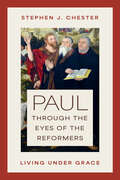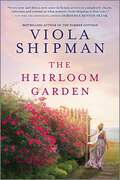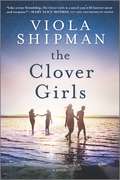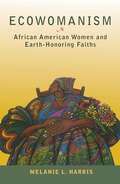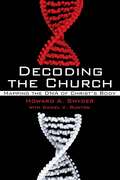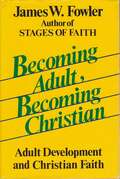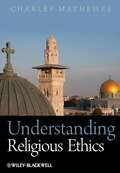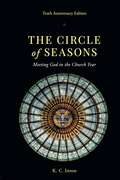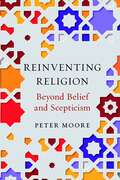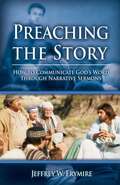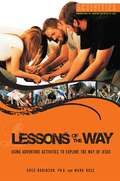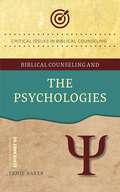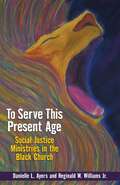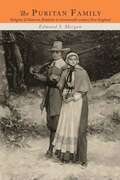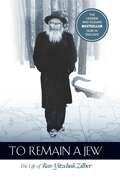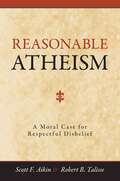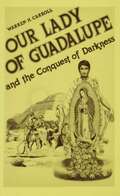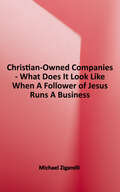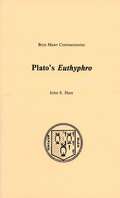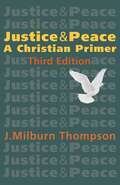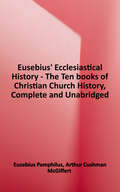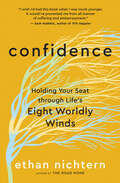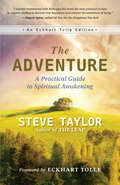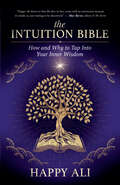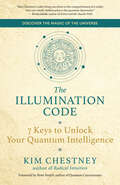- Table View
- List View
Paul through the Eyes of the Reformers: Living under Grace
by Stephen J. ChesterA brilliant reappraisal of Protestant Reformers&’ views on Paul In this incisive book, Stephen Chester challenges misconceptions and provides new insights into how sixteenth-century Protestant Reformers interpreted the writings of Paul. Writing for those who are interpreting Pauline letters in and for today&’s world, Chester demonstrates the value of a nuanced and accurate understanding of the Reformers&’ views on Paul. Throughout the book, Chester draws on key ideas from his monumental work Reading Paul with the Reformers, which won Christianity Today&’s book of the year award in biblical studies. In Paul through the Eyes of the Reformers, Chester updates the argument and presents the ideas in a shorter and more accessible form designed for a broad readership. To help readers better understand the Reformers&’ historical and theological context, Chester surveys perspectives on Paul prior to the sixteenth century. Against this background, Chester illuminates the paradigm shifts in Pauline interpretation that unfolded during the Reformation, paying special attention to the work of Martin Luther, Philip Melanchthon, and John Calvin. He also discusses the promise and challenge of reading Paul with the Reformers today, highlighting the importance of engaging with the Reformers&’ work critically, reaching different conclusions from them where necessary, and taking inspiration from them when appropriate. Paul through the Eyes of the Reformers is a remarkable resource for biblical scholars who care about Paul and his theology.
The Heirloom Garden: A Novel
by Viola ShipmanFrom the USA Today bestselling author of The Summer Cottage In her inimitable style, Viola Shipman explores the unlikely relationship between two very different women brought together by the pain of war, but bonded by hope, purpose…and flowers.Iris Maynard lost her husband in World War II, her daughter to illness and, finally, her reason to live. Walled off from the world for decades behind the towering fence surrounding her home, Iris has built a new family…of flowers. Iris propagates her own daylilies and roses while tending to a garden filled with the heirloom starts that keep the memories of her loved ones alive.When Abby Peterson moves next door with her family—a husband traumatized by his service in the Iraq War and a young daughter searching for stability—Iris is reluctantly yet inevitably drawn into her boisterous neighbor&’s life, where, united by loss and a love of flowers, she and Abby tentatively unearth their secrets, and help each other discover how much life they have yet to live.With delightful illustrations and fascinating detail, Viola Shipman&’s heartwarming story will charm readers while resonating with issues that are so relevant today.Don't miss bestselling author Viola Shipman's charming new novel, THE WISHING BRIDGE—where an ambitious executive rediscovers the magic of family, friendship, home...and Christmas!Other books by Viola Shipman: Famous in a Small Town The Secret of Snow A Wish for Winter The Edge of Summer The Summer Cottage The Clover Girls
The Clover Girls: A Novel
by Viola ShipmanFrom the USA Today bestselling author of The Summer Cottage "Like a true friendship, The Clover Girls is a novel you will forever savor and treasure." —Mary Alice Monroe, New York Times bestselling authorElizabeth, Veronica, Rachel and Emily met at Camp Birchwood as girls in 1985, where over four summers they were the Clover Girls—inseparable for those magical few weeks of freedom—until the last summer that pulled them apart. Now approaching middle age, the women are facing challenges they never imagined as teens, struggles with their marriages, their children, their careers, and wondering who it is they see when they look in the mirror.Then Liz, V and Rachel each receive a letter from Emily with devastating news. She implores the girls who were once her best friends to reunite at Camp Birchwood one last time, to spend a week together revisiting the dreams they&’d put aside and repair the relationships they&’d allowed to sour. But the women are not the same idealistic, confident girls who once ruled Camp Birchwood, and perhaps some friendships aren&’t meant to last forever…USA TODAY bestselling author Viola Shipman is at her absolute best with The Clover Girls. Readers of all ages and backgrounds will love its powerful, redemptive nature and the empowering message at its heart.Don't miss bestselling author Viola Shipman's charming new novel, THE WISHING BRIDGE—where an ambitious executive rediscovers the magic of family, friendship, home...and Christmas!Other books by Viola Shipman: Famous in a Small Town The Secret of Snow A Wish for Winter The Edge of Summer The Summer Cottage The Heirloom Garden
Ecowomanism: African American Women and Earth-Honoring Faiths (Ecology & Justice)
by Melanie L. HarrisMelanie Harris argues that African American women make unique contributions to the environmental justice movement in the ways that they theologize, theorize, practice spiritual activism, and come into religious understandings about their relationship with the earth. This unique text stands at the intersection of several academic disciplines: womanist theology, eco-theology, spirituality, and theological aesthetics.
Decoding the Church: Mapping the DNA of Christ's Body
by Howard A. SnyderUsing the genetic code as a model, this provocative book will provide you with theological analysis, biblical principles, and practical applications for understanding the structure and mission of today's church and how it can transform the world
Becoming Adult, Becoming Christian: Adult Development and Christian Faith
by James W. FowlerDescribes four theories of psychological development, examines the theological and ethical issues of maturation, and discusses the covenant and vocation in the life of adult Christians
Understanding Religious Ethics
by Charles MathewesThis accessible introduction to religious ethics focuses on the major forms of moral reasoning encompassing the three ‘Abrahamic’ religions: Judaism, Christianity, and Islam. Draws on a range of moral issues, such as examples arising from friendship, marriage, homosexuality, lying, forgiveness and its limits, the death penalty, the environment, warfare, and the meaning of work, career, and vocation Looks at both ethical reasoning and importantly, how that reasoning reveals insights into a religious tradition Investigates the resources available to address common problems confronting Abrahamic faiths, and how each faith explains and defends its moral viewpoints Offering concrete topics for interfaith discussions, this is a timely and insightful introduction to a fast-growing field of interest
The Circle of Seasons: Meeting God in the Church Year
by K. C. IretonThe church year is a uniquely Christian way of marking time. In this engaging introduction to liturgical time, K. C. Ireton takes readers through the liturgical year--from Advent to the second cycle of Ordinary Time--describing the origin of each observance and showing how the seasons connect with the stories of Scripture and the seasons of our lives. The Circle of Seasons presents a simple and traditional way of building your life around your faith, rather than the other way around.
Reinventing Religion: Beyond Belief and Scepticism
by Peter MooreMany of us, proponents and critics alike, commonly make assumptions about religion. We may presume that religion is mainly about having beliefs or being good, or that it is concerned with spiritual rather than material issues, or that religious ideas and practices are meant to be somehow timeless. Such views, Peter Moore argues, work only to obscure the truth that religion is essentially humanity’s quest to become fully human. This enlightening exposition questions our very understanding of faith and contends that religions should remain open to reinventing themselves, both practically and intellectually, rediscovering neglected traditions and finding new ways forward. Written with subtlety and passion, this book gets to the heart of ongoing debates about the validity and purpose of religion.
Preaching the Story: How to Communicate God's Word Through Narrative Sermons
by Jeffrey W. FrymirePreaching the Story explores why communication is more effective when sermons are no longer lectures but stories. It explains how to deliver your entire sermon in story form. A practical book for pastors and ministerial students.
Lessons of the Way: Using Adventure Activities to Explore the Way of Jesus
by Greg Robinson Mark RoseWe cannot give what we do not have and we cannot teach what we do not live. Our best lessons come out of our own questions, our own searching, our own discoveries. Authenticity is the most important quality of a good teacher and in order to have that you must first consider and struggle with the same questions you want your students to struggle with. Lessons of the Way is a unique and comprehensive approach to spiritual formation and discipleship to Jesus that is grounded in the knowledge and use of experiential education. Stories, scriptures, activities and questions create the basis for action, reflection, change and growth. Here is an in-depth, practical resource for facilitators and leaders who want to embrace and share the foundational truths of spiritual formation found in its forerunner, Adventure and the Way of Jesus.
Biblical Counseling and The Psychologies
by Ernie BakerIn this book, my intention is to help you, the reader, to understand how a counseling theory is constructed. In addition, I want the book to be a reminder of the foundations and construction of a historic biblical-counseling approaching to life issues. I am hoping this will demonstrate the beauty of Scripture and help us grow in discernment as we hear the claims of other proposed models. Of course, this is all for the glory of God and the good of His people through the power of the gospel.
To Serve This Present Age: Social Justice Ministries in the Black Church
by Danielle L. AyersThe African American church has a charge to keep. KEY FEATURES: - Reviews the history of the black churchs social justice contributions and leadership - Establishes todays need for justice ministries in the congregation and community - Spotlights real-life ministries and initiatives - Provides sample training manual materials At a time when the African American church is increasingly associated with the controversial prosperity gospel, pastors Danielle Ayers and Reginald Williams remind black church leaders of the prophetic call to do justice. Exploring first the biblical foundations for justice work that goes beyond charity, the authors also recall the storied history of the black churchs leadership in the Civil Rights Movement. From there, this practical resource establishes the contemporary need for justice ministries in the congregation and the community. From initiatives of care and education to programs of action and collaboration, discover the transforming impact the church can have on society, culture, and community through diverse social justice ministries. Features Spotlights on real-life ministries and initiatives, common justice issues, and a resource guide to assist in the creation and sustaining of ministries of justice.
The Puritan Family: Essays on Religion and Domestic Relations in Seventeenth-Century New England
by Edmund S. MorganThe Puritans came to New England not merely to save their souls but to establish a "visible" kingdom of God, a society where outward conduct would be according to God's laws. This book discusses the desire of the Puritans to be socially virtuous and their wish to force social virtue upon others. Morgan provides a detailed discussion of the literature of the Puritans with bibliographical detail about the titles and authors that most influenced them. Specifically, Morgan discusses Puritan tribalism, the family, servants and religion. Morgan was an eminent authority on early American history, was Sterling Professor of History at Yale University, where he taught from 1955 to 1986 and directed many PhD dissertations. He specialized in American colonial history, with some attention to Puritan history, and was noted for his incisive writing style.
To Remain a Jew: The Life of Rav Yitzchak Zilber
by Rabbi Zilber BentzionIn the biting, forbidding winds of Communist Russia, one man staunchly refused to submit. Not through terrible imprisonment, and not under the threat of mortal peril. In this magnificent story, Rav Yitzchak Zilber's devotion and sacrifice for Torah Judaism under oppression shines through in the bleakness of what was. The "father" to countless unfortunate Jews in the Soviety Union and Eretz Yisrael, and an extraordinary figure in the kiruv movement in Eretz Yisrael and in the Diaspora, Rav Yitzchok was renowned for standing up for his beliefs and encouraging hundreds of others to do the same. With photographs, anecdotes, and a compelling tone, this autobiography, comprised of accounts Rav Zilber told during his lifetime, this is truly an uplifting read. Translated from the original Russian and Hebrew editions.
Reasonable Atheism: A Moral Case For Respectful Disbelief
by Scott F. Aikin & Robert B. TalisseA recent poll from the University of Minnesota finds that atheists are America's least trusted social group. Perhaps compounding this negative impression is the attack-dog persona taken on in the past decade by the "New Atheists." Not only have they been quite public about their disbelief, but they've also stridently lambasted religious belief generally in a number of bestselling books. Disturbed by this negative public perception and the deterioration in the tone of open debate, the authors of this eminently reasonable work attempt to introduce a note of civility and rational clarity. To both religious believers and fellow atheists they counsel a measured approach that combines serious intellectual engagement with respect for the reasonableness of the other side's position. The heart of the book is the authors' moral case for atheism. Atheism, they contend, manifests a decidedly moral concern for others and their wellbeing. The authors further argue that atheism is driven by the kinds of moral considerations that should be familiar to all religious believers. Atheists are motivated by a moral concern for others, a desire to alleviate suffering and combat evil, and an appreciation for the value of life, freedom, and responsibility. In the end, the authors make not only a compelling case for atheism but also for the value and necessity of mutual respect in a democratic society composed of diverse citizens.
Our Lady of Guadalupe: And the Conquest of Darkness
by Warren H. CarrollStandard histories on the Age of Colonization tell a sad story of the ills inflicted on indigenous peoples by exploitative Western powers. This book offers a realistic corrective. The Spanish conquest of the New World is shown vividly—in its fervor and exuberance, but most importantly, with its central evangelical and civilizing impulse that transformed the Americas from savagery into a central part of Christendom.
Christian-Owned Companies: What does it look like when a follower of Jesus runs a business?
by Michael ZigarelliOne Question, Fifty Companies, Eight Practical Answers. What does it look like when a follower of Jesus runs a business? It’s a question we’re asking more than ever before, from the front lines of business to the front page of the newspaper to the front row of the classroom. But our answers tend to be incomplete—personal anecdotes, media narratives, or simply revisiting the usual suspects. Christian-Owned Companies, the stories of 50 for-profit businesses, is the most thorough investigation of the question to date, uncovering eight practical answers. For business leaders, it’s a road map. For academics, it’s a theory. For students, it’s a curriculum. And for a confused culture, it’s a corrective to the stereotypes of the left and the right. Join Professor Zigarelli for an in-depth look at what Christian-owned companies really do and how they do it.
Plato's Euthyphro
by Plato John E. HareThese lexical and grammatical notes are meant not as a full-scale commentary but as a clear and concise aid to the beginning student. The editors have been told to resist their critical impulses and to say only what will help the student read the text.
Justice and Peace: A Christian Primer
by J Milburn ThompsonThe third edition of this popular classroom text provides thoroughly revised and updated discussions of key topics including ethno-nationalist conflict, terrorism, and poverty and development. The author provides an introduction to current obstacles to justice and peace across the globe, and encourages Christians to draw upon an informed faith to transform themselves and the world.
Eusebius' Ecclesiastical History: The Ten Books of Christian Church History, Complete and Unabridged
by Eusebius PamphilusAll ten books of Eusebius' famous church history are presented here complete in a superb and authoritative translation. Eusebius' Ecclesiastical History is one of the first comprehensive, chronologically arranged histories ever written about the Christian church, and it is consulted by scholars and historians to this day. Eusebius authored his history as the Roman Empire's influence upon the European continent waned amid insurgencies and surrender of Roman lands to other peoples. This also a time in which Christianity's influence upon Europe's peoples burgeoned and grew. As one of the very few learned and scholarly Christians of his era, Eusebius enjoyed a rare privilege: access to the document archives of the early Christian church. Much of these archives have since been lost; Eusebius' use of these long lost texts is the only window which readers of today have to such records. Thus, a sense of mystery is present as events for which scant evidence still exists are told.
Confidence: Holding Your Seat through Life’s Eight Worldly Winds
by Ethan NichternHow do we stand firm amid the ups and downs of existence? In today’s culture of polarization and constant change, how do we find the confidence to navigate challenges? Is now really the time for meditation, for looking inward? What do we do with mindfulness? Meditation teacher Ethan Nichtern tackles these questions, taking contemporary considerations of power, identity, ethics, and confidence to new heights in this essential guide to self-discovery. Ethan examines the Buddhist concept of the Eight Worldly Winds, the four paired opposites of praise and blame, pleasure and pain, fame and insignificance, and success and failure. Delving into these dichotomies reveals invaluable insights into our relationships with others (including teachers, friends, leaders, the disgraced, and the adored) and ourselves. With transformative meditation exercises, Confidence empowers us to cultivate and access our innate wisdom.
The Adventure: A Practical Guide to Spiritual Awakening (An Eckhart Tolle Edition)
by Steve TaylorStep-by-step practices for cultivating spiritual awakening, from a renowned spiritual psychologist who has studied the phenomenon in hundreds of people and experienced it himself Steve Taylor has devoted his life to investigating spiritual awakening. In his books The Leap and Extraordinary Awakenings, he discussed case histories of dozens of people who experienced profound shifts in consciousness. The Adventure draws on this groundbreaking research, together with Taylor’s own awakening experiences, to offer guided meditations, contemplative exercises, and other practices for catalyzing spiritual transformation, as well as lyric poems and inspirational stories. The Adventure outlines how to: • recognize and cultivate the eight defining characteristics of wakefulness, including presence, acceptance, gratitude, and disidentification from the ego • expand awareness and quiet the mind through meditations and practical exercises • transcend our normal “sleep” state and the “thought mind” to move toward increasing heights and depths of spiritual awakening • use the challenges of everyday life — of home, workplace, and relationships — as doorways to enlightenment
The Intuition Bible: How and Why to Tap Into Your Inner Wisdom
by Happy AliWhat if there is a way to tap into a well of knowledge to guide you on life’s journey? What if you could cut through the constant barrage of conflicting and overwhelming information? Each of us possesses an innate source of guidance: our power of intuition. Unfortunately, we are rarely trained to tap into this wisdom, and it’s often misunderstood. Author Happy Ali aims to change that. Presenting insights into the inner workings of the universe, inspiring true stories, and simple experiments, Happy shows how we can all access and use this marvelous way to find clarity amid the chaos. Intuition helped Happy anticipate his own successes (and tragedies), equipping him for the joys and challenges that awaited him. The Intuition Bible presents the approach he has taught thousands of seekers, which includes: • reasons and remedies for blockages and misinterpretations • how to understand dreams, vibrations, chakras, and energy • a range of techniques, including simple-yet-powerful yes/no exercises, to assist in everyday decision-making and refine personal intuition
The Illumination Code: 7 Keys to Unlock Your Quantum Intelligence
by Kim Chestney“Kim Chestney’s codes bring you closer to the comprehension of a reality that was wholly hidden prior to the quantum discoveries.” — Ervin László, author of Science and the Akashic Field Intuition — the extraordinary ability to access information from the quantum realms — is fast becoming humanity’s most advanced form of knowledge acquisition. The Illumination Code presents seven keys to unlock your inner dimension so you can access expanded states of awareness that exist beyond the limits of the rational mind. Kim Chestney reveals the deeply personal nature of the universe while offering a new way to know the unknowable and experience the seemingly impossible. As you venture inward on this step-by-step journey, you will gain profound insights and discover the true power of your own inner wisdom.
